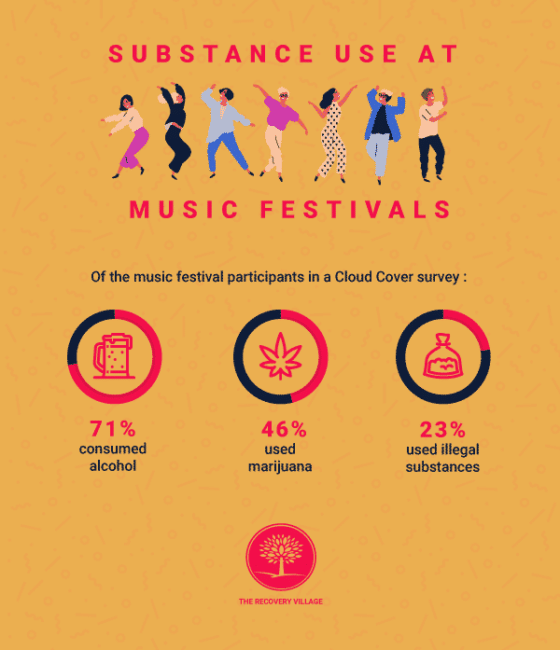Are you one of the millions of people attending a music festival this season? Learn about the risks of substance use at music festivals.
Music festivals have become so popular that some of the most famous ones, like Coachella, Burning Man and Electric Daisy Carnival (EDC) sell out in minutes. Festival-goers buying the tickets are also often planning to use or experiment with at least one kind of substance at the event. In fact, according to streaming platform Cloud Cover, only one in four people attend a music festival sober.
With 63 percent of festival goers claiming that the music festival they attended was life-changing, researchers question whether that has to do with substance use. The most commonly used drugs at festivals, according to the survey by Cloud Cover are alcohol, marijuana and illicit drugs. Of the participants in the survey 71 percent consumed alcohol, 46 percent used marijuana and 23 percent used illegal substances like MDMA and cocaine.

Substance abuse and music festival statistics.
The Growth of Music Festivals
Before the 21st century, there were just a few multi-day music festivals. Currently, there are over 800 festivals in the United States. Woodstock is the earliest recognized festival, advertised as “three days of peace and music” — and drugs. The most commonly used drug that weekend was marijuana; 80 people were arrested for using the drug but none were taken into custody.
Festival organizers credit social media with the significant growth of music festivals across the world. One of the largest ticketing sites, Eventbrite, says, “ social media is a natural driver for [festival] growth, as fans share the fun and camaraderie that festivals generate.”
Sharing the Music — and the Drugs
Beyond the social media community, music festivals provide a sense of community for the festival attendees. Most participants attend festivals for the music, but they also buy tickets for the festival culture, which unfortunately often involves drugs. For some people, creating a deeper connection with music and friends means experimenting with substances.
Festival-goers mostly use drugs to enhance their experience and drugs are typically widely available at festivals. For that reason, people will commonly use stimulants like cocaine and substances that increase euphorias, like ecstasy or MDMA. Ecstasy is also most often the cause of overdoses and death at festivals because of the risk of hydration and hypothermia — which are common side effects of ecstasy use. In combination with sun exposure and excessive physical activity, like dancing, these side effects can be exacerbated.
Alcohol is another substance that is responsible for a high number of overdoses because of the side effects like dehydration or due to mixing it with other drugs. In addition to overdoses and alcohol poisonings, there are other risks associated with drug use at festivals.
Risks Associated with Substance Use at Music Festivals
Substance use at music festivals can be dangerous for several reasons. The side effects can cause a higher risk of sexual assault, violence, overdose and alcohol poisonings, among other consequences.
Festival-goers purchasing drugs at music festivals may also be at a higher risk of taking fake drugs or substances that are “cut” with other, more potent drugs or substances like rat poison. Festival-goers are often buying drugs from strangers, so they don’t know exactly what they are purchasing or consuming.
Another risk of using substances at a festival in combining several substances at once, which can increase the side effects and contribute to overdose or death.
While statistics show that drug use is common at music festivals, of course, not everyone in attendance is using a substance. It is possible to enjoy a music festival sober and with hundreds of music festivals across the country, you’re likely to find one you will enjoy and maintain your sobriety.
If you or someone you know is struggling with a substance use disorder, help is available. At The Recovery Village, a team of professionals can design an individualized treatment program to address substance use and co-occurring disorders. Call and speak with a representative to learn more about which program could work for you.

Cloudcovermusic.com. “Music Festivals Experiences Analyzed Over Time.”Cloud Cover Music. Accessed May 1, 2019.
Grace, Anna. “Study: 1 in 4 People Attend Festivals Sober.” Ig-Mag, March 27, 2019. Accessed May 1, 2019.
The Recovery Village aims to improve the quality of life for people struggling with substance use or mental health disorder with fact-based content about the nature of behavioral health conditions, treatment options and their related outcomes. We publish material that is researched, cited, edited and reviewed by licensed medical professionals. The information we provide is not intended to be a substitute for professional medical advice, diagnosis or treatment. It should not be used in place of the advice of your physician or other qualified healthcare providers.